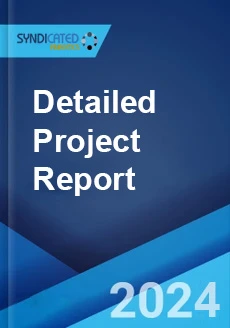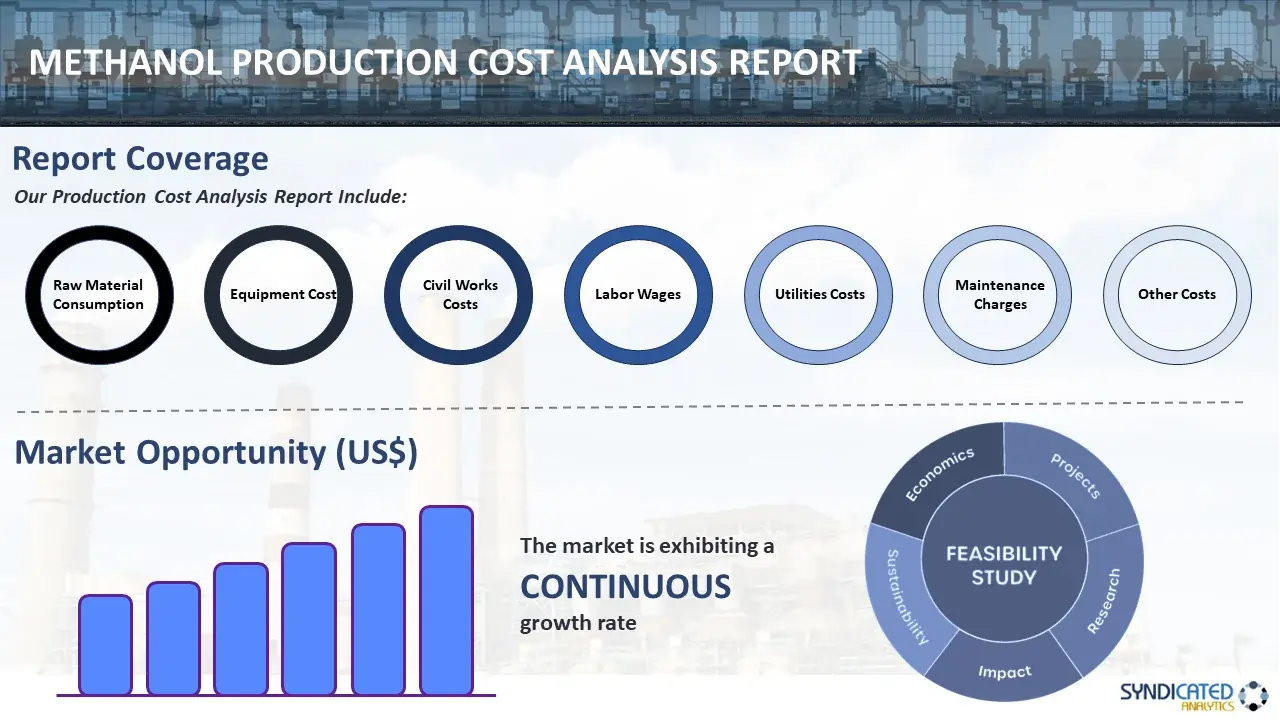
Methanol Production Cost Analysis Report 2025 Edition: Industry Trends, Capital Investment, Price Trends, Manufacturing Process, Raw Materials Requirement, Operating Cost, and Revenue Statistics
Report Overview:
The report by Syndicated Analytics, titled “Methanol Production Cost Analysis Report 2025 Edition: Industry Trends, Capital Investment, Price Trends, Manufacturing Process, Raw Materials Requirement, Operating Cost, and Revenue Statistics,” offers a comprehensive examination of the operating costs and revenue statistics associated with establishing a methanol plant. It is the culmination of extensive primary and secondary research, encompassing a detailed analysis of market trends and the impact of COVID-19 on both global and regional levels. Additionally, it provides profiles of key industry players. The report also delves into price trends, mass balance required raw materials, and the various unit operations integral to the methanol manufacturing process. It includes a comprehensive capital cost analysis while covering the cost breakdown of raw materials, utilities, labor, packaging, transportation, land and construction, and machinery. The study also presents projected profit margins and recommends optimal product pricing strategies. For individuals contemplating entry into the methanol industry or those with vested interests, this report is an essential resource.

Methanol Market Overview:
The need for methanol as a vital feedstock for the synthesis of certain chemicals, such as formaldehyde, acetic acid, methyl tert-butyl ether (MTBE), and olefins, is driving the market. Methanol usage is driven by the need for these chemicals in sectors like manufacturing, building, and the automobile industry. Furthermore, the product's increasing use as a fuel additive and alternative energy, especially when blended with gasoline and diesel, is propelling the market expansion. In addition, the advancement of methanol-to-olefins (MTO) technology makes it possible to convert methanol into ethylene and propylene, which are crucial constituents of polymers and plastics. For instance, BASF SE and Envision Energy announced they would jointly develop technology to convert green hydrogen and CO2 into sustainable methanol. Envision Energy will devise its own process using BASF SE's catalyst technology and will then license it to its customers so that they can build larger, sustainable methanol or e-methanol plants.
Methanol Market Trends:
Rising Technological Advancements
The rising advances in methanol production technologies, such as improved catalysts and process efficiencies, reduce production costs and enhance its competitiveness in global markets, which is a major driving factor for this compound. Besides this, there is an increasing interest and investment in renewable methanol, produced from sources, including biomass, industrial waste gases, or captured carbon dioxide. Renewable methanol aligns with sustainability goals and offers a greener alternative to conventional methanol production. For example, Linde announced the expansion of its existing agreement with Celanese Corporation to supply carbon dioxide and hydrogen to the Celanese manufacturing facility in Clear Lake, Texas, to produce methanol. This agreement would assist the company in reducing its carbon footprint during the operation, contributing to the preservation of the environment and allowing the organization to strengthen its business portfolio.
Integration with Renewable Energy
Methanol's compatibility with renewable energy sources, such as hydrogen derived from electrolysis, facilitates the production of green methanol. This integration supports decarbonization efforts and enhances methanol's role in the energy transition. In line with this, the compound is gaining attention as a fuel for various applications, including transportation (e.g., methanol-powered vehicles, marine vessels) and power generation. It is recognized for its potential to reduce greenhouse gas emissions and improve air quality compared to traditional fuels. For example, the global demand for gasoline is anticipated to reach 28.2 million barrels per day in 2030, registering a 9.7% increase over 25.7 million barrels per day in previous years, according to the Organization of the Petroleum Exporting Countries (OPEC).
Moreover, according to the Organization for Economic Co-operation and Development (OECD), the global consumption of biofuels, including biodiesel, is expected to register a growth of 13.1% to reach 210.7 billion liters in 2029 compared to 186.35 billion liters formerly.
Latest Industry News:
- Enerkem announced that it will be retiring its Enerkem Alberta Biofuels (EAB) plant in Edmonton. The facility achieved its main objective of completing the commercial scale-up of Enerkem’s industry-leading technology with more than 15,000 hours of operation producing ethanol and methanol.
- Fairway Methanol is a 50-50 joint venture between Mitsui & Co. and Celanese Corporation that began the production of methanol by using carbon dioxide emitted from plants surrounding the venture’s facility.
This report is essential reading for entrepreneurs, investors, researchers, consultants, and business strategists with interests in the methanol industry. It offers a thorough examination of the current state of the industry and its future potential, supplying valuable information for informed decision-making and strategic planning. Serving as an invaluable resource, this report provides a detailed exploration of the methanol industry, making it an indispensable tool for those looking to establish a strong presence in this dynamic sector.
The following technical and economic aspects are included in the report:
- Market Trends
- Impact of COVID-19
- Major Regions
- Key Manufacturers
- Price Trends
- Mass Balance and Raw Material Requirements
- Various Types of Unit Operations Involved
- Raw Material Costs
- Utility Costs
- Labor Costs
- Packaging Costs
- Transportation Costs
- Land and Construction Costs
- Machinery Costs
- Profit Margins
- Product Pricing
Key Questions Answered in This Report-
- What are the various unit operations involved in manufacturing methanol?
- What are the raw material requirements and costs in manufacturing methanol?
- What are the utility requirements and costs in manufacturing methanol?
- What are the manpower requirements and costs in manufacturing methanol?
- What are the packaging requirements and costs in manufacturing methanol?
- What are the transportation requirements and costs in manufacturing methanol?
- What are the land requirements and costs in manufacturing methanol?
- What are the construction requirements and costs in manufacturing methanol?
- What are the profit margins in methanol?
- What should be the pricing mechanism of methanol?
Need a Customized Project Report?
Although we have tried to make the report as comprehensive as possible, we believe that every stakeholder may have their specific requirements. In view of this, we can customize the report based on your particular needs. You can share your business requirements with our consultants, and we will provide you a tailored scope. Some of the common customizations that our clients request us include:
- The report can be customized based on the country/region that you plan to set up your plant.
- The manufacturing capacity of the plant can be customized based on your requirements.
- Machinery suppliers and costs can be customized based on your requirements.
- Any additions to the current scope can also be provided based on your requirements.
Why buy Syndicated Analytics reports
- Our reports provide stakeholders insights into the viability of a business venture, allowing them to make informed business decisions.
- We have a strong network of consultants and domain experts in 100+ countries across North America, Europe, Asia Pacific, South America, Africa, and the Middle East.
- We have a strong database of equipment and raw material suppliers across all major continents.
- We regularly track and update land costs, construction costs, utility costs, labor costs, etc. across 100+ countries around the globe.
- We are the trusted business partners of the world’s leading corporates, governments, and institutions. Our client list ranges from small and start-up businesses to Fortune 500 companies.
- Our strong in-house team of engineers, statisticians, modeling experts, charted accountants, architects, etc. have been instrumental in building, expanding, and optimizing sustainable manufacturing plants across the globe.
Purchase Options
Ask For Customization
Personalize this research
Triangulate with your own data
Get data as per your format and definition
Gain a deeper dive on a specific application, geography, customer or competitor
Any level of personalization
Get in Touch
Call us on
US: +1-213-316-7435
Uk: +44-20-8040-3201
Drop us an email at
sales@syndicatedanalytics.com